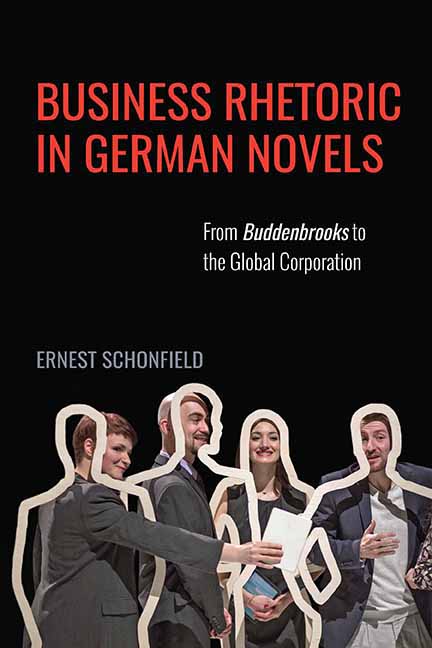Book contents
- Frontmatter
- Dedication
- Contents
- Acknowledgments
- List of Abbreviations
- Introduction
- 1 Managing Appearances in Thomas Mann's Buddenbrooks, 1901
- 2 Oratory and Publicity in Heinrich Mann's Der Untertan, 1914/18
- 3 Organizing Speech in Gabriele Tergit's Käsebier erobert den Kurfürstendamm, 1931
- 4 Seeing through the Rhetoric in Bertolt Brecht's Dreigroschenroman, 1934
- 5 Giving an Account of the Self in Ingeborg Bachmann's Malina, 1971
- 6 Negotiating Bureaucracy in Hermann Kant's Das Impressum, 1972
- 7 Corporate Discourse in Friedrich Christian Delius's Unsere Siemens-Welt, 1972
- 8 Producing Ethos in Kathrin Röggla's wir schlafen nicht, 2004
- 9 Communicative Contests in Philipp Schönthaler's Das Schiff das singend zieht auf seiner Bahn, 2013
- Conclusion
- Notes
- Bibliography
- Index
8 - Producing Ethos in Kathrin Röggla's wir schlafen nicht, 2004
Published online by Cambridge University Press: 15 August 2018
- Frontmatter
- Dedication
- Contents
- Acknowledgments
- List of Abbreviations
- Introduction
- 1 Managing Appearances in Thomas Mann's Buddenbrooks, 1901
- 2 Oratory and Publicity in Heinrich Mann's Der Untertan, 1914/18
- 3 Organizing Speech in Gabriele Tergit's Käsebier erobert den Kurfürstendamm, 1931
- 4 Seeing through the Rhetoric in Bertolt Brecht's Dreigroschenroman, 1934
- 5 Giving an Account of the Self in Ingeborg Bachmann's Malina, 1971
- 6 Negotiating Bureaucracy in Hermann Kant's Das Impressum, 1972
- 7 Corporate Discourse in Friedrich Christian Delius's Unsere Siemens-Welt, 1972
- 8 Producing Ethos in Kathrin Röggla's wir schlafen nicht, 2004
- 9 Communicative Contests in Philipp Schönthaler's Das Schiff das singend zieht auf seiner Bahn, 2013
- Conclusion
- Notes
- Bibliography
- Index
Summary
weil das natürlich für unternehmen sehr entscheidend sei—die frage “wie kommuniziere ich” … wie man vertrauen herstellen könne
[because of course that was really decisive for companies—the question “how do I communicate” … how one could manufacture trust]
—Kathrin RögglaIntroduction: No More Rest Periods
IN AN INTERVIEW published in the Frankfurter Allgemeine Zeitung on November 14, 2015, Janina Kugel, personnel director of Siemens, explained that employment law needs to be changed in response to digitalization, adding that she often debates this issue with government representatives. Kugel argued that “die vorgeschriebenen Ruhezeiten” (mandatory rest periods) are “Unsinn” (nonsense) because of flextime. According to Kugel, it is not efficient to calculate whether or not the employee was offline long enough to comply with the rest periods— quite an ironic statement, given that Siemens specializes in data processing. Therefore, she says, rest periods should be abolished: “Das passt nicht mehr in die Zeit” (It is no longer appropriate today). This genre of managerial discourse is echoed and examined by Kathrin Röggla (b. 1971) in wir schlafen nicht (2004; We Never Sleep), which derives from a series of interviews she conducted with German-speaking finance experts based in New York. Her first interviewee was an investment banker for Morgan Stanley, whom she visited in his office in midtown Manhattan. Although wir schlafen nicht is ostensibly set at a trade fair in Germany (the location is most reminiscent of Düsseldorf), Röggla's use of US-based source material is justified by the global interconnectedness of the German economy. Like Delius's Unsere Siemens-Welt in the previous chapter, wir schlafen nicht is documentary fiction and represents an investigation into a particular genre of corporate rhetoric. The economic environment changed considerably, however, in the three decades between Delius's text and Röggla's, particularly in terms of deregulation.
From the 1980s onward there have been successive waves of deregulation and privatization in Western economies. The collapse of the Soviet bloc in 1989–90 and the reunification of Germany intensified this process. Since the 1980s, “deregulation” is often promoted as a way to make industries more competitive, although, as David Graeber has noted, it usually meant the opposite, marking a shift from “managed competition between midsized firms” to a situation where “a handful of financial conglomerates …
- Type
- Chapter
- Information
- Business Rhetoric in German NovelsFrom Buddenbrooks to the Global Corporation, pp. 153 - 170Publisher: Boydell & BrewerPrint publication year: 2018

